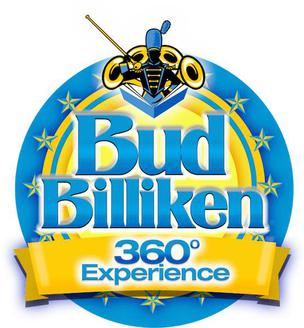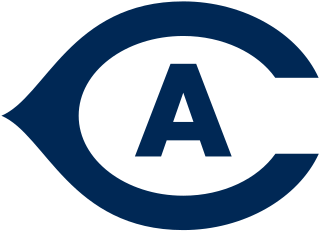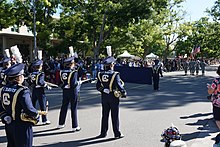
Davis is the most populous city in Yolo County, California, United States. Located in the Sacramento Valley region of Northern California, the city had a population of 66,850 in 2020, not including the on-campus population of the University of California, Davis, which was over 9,400 in 2016. As of 2019, there were 38,369 students enrolled at the university.

The University of California, Davis is a public land-grant research university in Davis, California, United States. It is the northernmost of the ten campuses of the University of California system. The institution was first founded as an agricultural branch of the system in 1905 and became the seventh campus of the University of California in 1959.

The Rose Parade, also known as the Tournament of Roses Parade, is an annual parade held mostly along Colorado Boulevard in Pasadena, California, United States, on New Year's Day.
Robert Michael Bellotti is an American college football analyst for ESPN and ABC. He was with the University of Oregon's football program for over 20 years serving as offensive coordinator for six years, head coach for 14 years, and athletic director for one year. Bellotti is the winningest coach in Oregon football history and is credited with building the program into a major football power. He was elected to the College Football Hall of Fame in 2014.

Students of the University of California at Davis who attend sporting events can join the Aggie Pack, the largest student-run university spirit organization in the United States. The Aggie Pack was started in 1992 as an attempt to increase attendance at games and events, and was successful. Membership is free and automatic for students, offers chances to win merchandise and food, and provides a very raucous encouragement to the athletes. Students band together as one large group, invent cheers, and support the UC Davis Aggies with their enthusiasm. In past recent years, the more energetic members of the Pack, known as Aggie Pack Extremists, tended to dress up in elaborate yale blue and gold costumes and dairy cow makeup. One Aggie Pack cheer is "Go Ags!". The Aggie Pack, as well as the crowd, sing the Aggie Fight song during sporting events.

The UC Davis Marching Band is the official marching band of the University of California, Davis, organized in fall of 2019. It is the successor to the student-run California Aggie Marching Band-uh!, which existed from the 1920s to 2019. In 2018, the Band-uh had roughly 250 members. It performed at home and away games to cheer on the UC Davis Aggies sports teams, marched in parades, and played at events on the UC Davis campus as well as in the surrounding Davis community.

The University Credit Union Center is an 7,600-seat indoor multi-purpose stadium on the campus of the University of California, Davis in unincorporated Yolo County, California.

UC Davis Health Stadium is a 10,743-seat multi-purpose stadium in the western United States, located on the campus of the University of California, Davis in unincorporated Yolo County, California. Opened as Aggie Stadium on April 1, 2007, it replaced Toomey Field and is the home to the UC Davis Aggies football and women's lacrosse teams. Plans call for the stadium to eventually be built out to 30,000 seats.

The Bud Billiken Parade and Picnic is an annual parade held since 1929 in Chicago, Illinois. The Bud Billiken Day Parade is the largest African-American parade in the United States. Held annually on the city's south side on the second Saturday in August, the parade route travels on Dr. Martin Luther King Drive through the Bronzeville and Washington Park neighborhoods. At the end of the parade, in the historic Washington public park is a picnic and festival. Robert S. Abbott, the founder and publisher of the Chicago Defender newspaper, created the fictional character of Bud Billiken, which he featured in a youth advice column in his paper. David Kellum, co-founder of the newspaper sponsored Bud Billiken Club and longtime parade coordinator suggested the parade as a celebration of African-American life.

The Davis Men's Crew Club is a collegiate sports club representing the University of California, Davis in rowing. As a non-funded team, it is a member of the Western Intercollegiate Rowing Association (WIRA), whose participants are mostly of non-Pac-10 schools on the West Coast. Nationwide, the team is one of the most successful collegiate rowing club programs in the United States, making periodic appearances in the Intercollegiate Rowing Association national championships, the Eastern College Athletic Conference and, more recently, the American Collegiate Rowing Association national championships. Notable alumni include Seth Weil, who rowed in the USA men's coxless four at the 2016 Rio Olympics and who holds two world rowing championship first place titles in the men's four; as well as Carlo Facchino who has a place in the Guinness Book of World Records for the fastest Pacific Ocean crossing from Monterey, CA to Honolulu, Hawaii with a time of 39 days, 9 hours and 56 minutes.
Jim Sochor was an American football player, coach, and college athletics administrator. He served as the head football coach at the University of California, Davis from 1970 to 1988 during which time compiling a record of 156–41–5 and won 18 consecutive conference championships, then a college football record. Sochor also served as the athletic director at UC Davis from 1989 to 1991. He was inducted into the College Football Hall of Fame as a coach in 1999.

The Causeway Classic is the annual college football game between the Sacramento State Hornets and the UC Davis Aggies in the United States. The teams exchange a Causeway Classic Trophy made from cement taken from the Yolo Causeway.
The Sacramento State Marching Band(SSMB) is the official marching band at California State University, Sacramento. To this day the band performs at all home football games and various away games during the football season. The SSMB also functions as the de facto student cheering section at athletic events, as it is the largest and loudest spirit organization of Sacramento State's campus. The SSMB also is present every year during the Causeway Classic against its arch-rival: UC Davis.

The UC Davis Aggies football team represents the University of California, Davis in NCAA Division I Football Championship Subdivision (FCS). The football program's first season took place in 1915, and has fielded a team each year since with the exception of 1918 during World War I and from 1943 to 1945 during World War II, when the campus, then known as the University Farm, was shut down. The team was known as the Cal Aggies or California Aggies from 1922 to 1958 when UC Davis was called the Northern Branch of the College of Agriculture.

The UC Davis Aggies are the athletic teams that represent the University of California, Davis.
The Department of Applied Science at the University of California, Davis was a cooperative academic program involving the University of California, Davis and the Lawrence Livermore National Laboratory (LLNL). It was established in the fall of 1963 by Edward Teller, director of LLNL, and Roy Bainer, then dean of the UC Davis College of Engineering. The department was discontinued in 2011.
Martha Smeltzer West an American attorney and legal scholar who served as general counsel for the American Association of University Professors and Professor Emerita at the UC Davis School of Law. In 1998, she won California's first federal grant under the Violence Against Women Act, using the money to found the Family Protection and Legal Assistance Clinic at UC Davis Law School. West was the lead author of the 2005 white paper "Unprecedented Urgency: Gender Discrimination in Faculty Hiring at the University of California" and of the 2006 AAUP report "Organizing around Gender Equity."

Gary Stephen May is the chancellor of the University of California, Davis. From May 2005 to June 2011, he was the Steve W. Chaddick School Chair of the School of Electrical & Computer Engineering at Georgia Tech. He served as the Dean of the Georgia Tech College of Engineering from July 2011 until June 2017.

The UC Davis pepper spray incident occurred on November 18, 2011, during an Occupy movement demonstration at the University of California, Davis. After asking the protesters to leave several times, university police pepper sprayed a group of student demonstrators as they were seated on a paved path in the campus quad. The video of UC Davis police officer Lt. John Pike pepper-spraying demonstrators spread around the world as a viral video and the photograph became an Internet meme. Officer Alex Lee also pepper sprayed demonstrators at Pike's direction.













